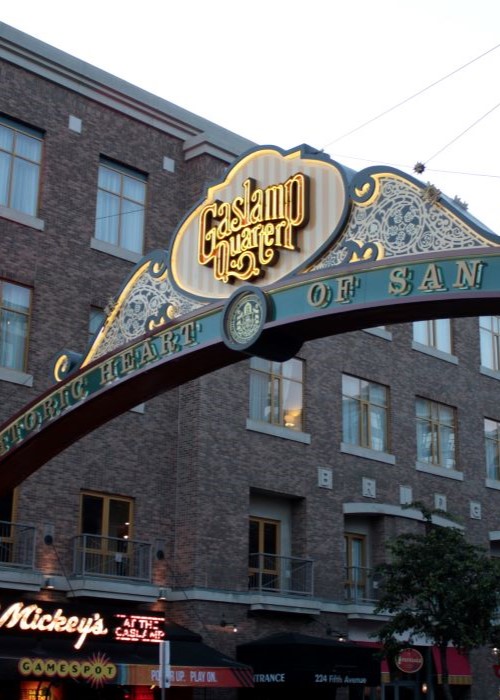A viral video taken outside Henry’s Pub in downtown San Diego on its final night in business this week has reignited a firestorm over illegal street vending, immigration policy, and the crushing costs of doing business in California. The video, which racked up over 18 million views in 24 hours, shows a worker from Henry’s Pub—visibly fed up — flipping a hot dog cart as partygoers packed the Gaslamp streets.
To many struggling business owners, that act of frustration captured years of simmering tension. Californians have had to deal with sky-high taxes, the closures of their businesses during COVID lockdowns, mounting regulations, and a wave of illegal food vendors flooding downtown areas with no health oversight, no financial contribution to the community, and no accountability.
The Law That Opened the Floodgates
It all traces back to Senate Bill 946, passed in 2018. The law decriminalized street vending statewide and handcuffed cities like San Diego from enforcing tough local rules. Supporters called it a win for “equity” and “marginalized people,” especially immigrants looking to launch “micro-businesses” without big start-up costs. They also framed it as a matter of justice: too many vendors, often undocumented, were being ticketed, arrested, or deported for minor violations, according to state Democrats.
But critics say the law went too far. SB 946 stripped cities of real power to act — unless they could justify restrictions on narrow health or safety grounds.
San Diego responded by banning vending in the Gaslamp Quarter year-round in 2022, then revised the ordinance again in 2024 to strengthen enforcement. But business owners say it’s all talk. In fact, according to a lawsuit filed by several San Diego businesses, the city’s refusal to enforce the ordinance has encouraged a criminal syndicate that allegedly can be tied back to the Mexican drug cartels to flood San Diego’s streets with illegal migrant vendors
“We’re Playing by the Rules. They’re Not.”
Mareous Sitto, a legal immigrant from the Middle East, once owned Ghost Heist Tacos, a licensed restaurant in the heart of the Gaslamp. But despite following all the rules — permits, inspections, taxes — he says he couldn’t compete with the flood of unlicensed hot dog vendors operating outside his doors every night.
“I was losing $1,500 to $2,000 a night,” Sitto told IW Features. “They don’t deal with permits or inspections. They just show up and take your customers.”
Sitto tried to adapt. He switched from shawarma to tacos to stay competitive. It didn’t help.
“The hot dog stands lined the streets after midnight, and people stopped coming in,” he said. “I eventually had to shut down.”
He says he’s witnessed vendors picking up hot dogs from the street and reselling them. Others, he says, have threatened his staff.
“I’ve seen businesses so angry they flipped over eight hot dog carts—and the vendors just picked up the hot dogs and kept selling them,” Sitto said. “One of my employees asked a vendor to leave and had a knife pulled on him.”
“We’re trying to do things the right way,” he added. “We create jobs that help people provide for their families. We follow the law. But we’re the ones paying the price.”
Sitto is far from the only business owner struggling as a result of these policies. Also in San Diego, Pete and Letty Soto, who operate Brooklyn Dogs, told IW Features they’re getting steamrolled every weekend.
“There are hundreds of them out there,” Pete said of the illegal vendors. “We’re doing everything right, and we’re getting crushed.”
Other business owners who spoke with IW Features reported being harassed when they speak up. They also raised serious concerns about public health: unlike legitimate, licensed businesses, illegal vendors don’t have to undergo food safety inspections or even guarantee refrigeration of their products.
“It’s not about being anti-vendor,” one business owner told IW Features. “It’s about fairness. We’re held to the law. They’re not. And the city is looking the other way.”
The City’s Silent Hand
Despite repeated complaints, business owners told IW Features the city has done next to nothing to address this crisis. In an effort to force change, a dozen Gaslamp businesses sued the city, Mayor Todd Gloria, and the City Council earlier this year, seeking $12 million in damages. They alleged the city was deliberately ignoring its own laws.
Moreover, Michael Curran, the attorney representing the downtown businesses, alleged in the complaint that the city’s “gross negligence” has “allowed what appears to be a large-scale criminal enterprise out of Los Angeles/Tijuana” to take over San Diego’s streets..
“Someone(s)/organization(s) are funding the illegal Sidewalk/Street Vendors as they roll out in the mornings and evenings at downtown events in trucks filled with food/drink carts,” the complaint, obtained by IW Features, reads. “Claimants have interviewed some of the illegal vendors who have indicated they are funded by the Mexican Cartels and are working off a debt to the Mexican Cartels for smuggling them into the Country across San Diego borders, illegally.”
And yet city officials “have done nothing to deter/regulate illegal, uncontrolled Street/Sidewalk Vending, particularly among illegal immigrants without ID,” the complaint continues. “Unless and until The City enacts/amends the Ordinance to allow SDPD/ICE/ABC to step up actual law enforcement and criminalize violations of the Ordinance, actual law enforcement officers will continue to be deprived of the ability to enforce the Ordinance by citation, confiscation of property/arrest/incarceration.”
A Brewing Backlash
This lawsuit is now on hold, but the resentment San Diego’s businesses feel toward city officials who have failed them is not.
Indeed, as the Henry’s Pub video continues to make waves online, it’s become more than just a viral clip — it represents a boiling point. And for business owners drowning in California taxes and red tape while unlicensed vendors flourish, it’s also proof that California’s priorities are upside down.











